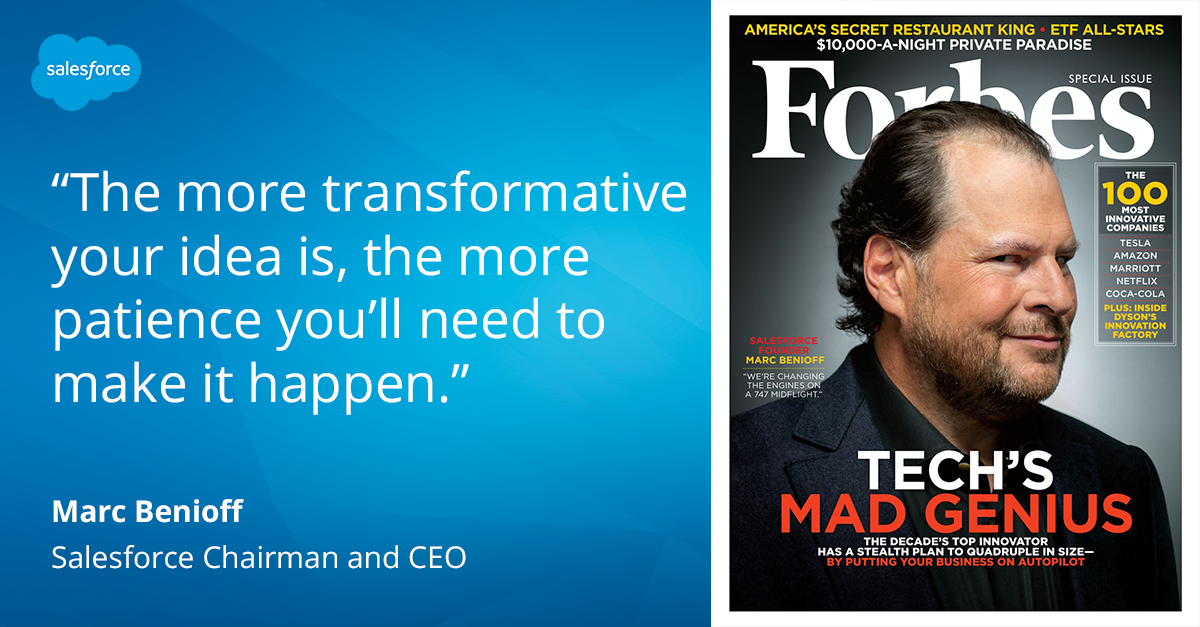Today, Forbes published a sweeping profile of Salesforce CEO Marc Benioff, dubbing him “Tech’s Mad Genius” and “The Decade’s Top Innovator.” It’s an unusual look inside the busy life of Salesforce’s dynamic leader — and whether you’re a budding entrepreneur or an experienced manager, there’s a lot to learn. (The article hits newsstands Sept. 13, but in the meantime, you can find it here.) Here are seven of our favorite takeaways.
Lesson #1: Always Be Innovating
In the Forbes profile, Benioff dropped a few early hints about our new artificial intelligence (AI) technology, Salesforce Einstein, which will be revealed at Dreamforce on Oct. 4-7. (Register here.) Einstein, Benioff predicts, will power the next decade of growth at Salesforce. “If this is not the next big thing, I don’t know what is,” Benioff told Forbes.
Lesson #2: Be Inspired By What You Do
If you’ve seen Benioff speak (as he does every year at Dreamforce), you know the infectious enthusiasm he brings to a room. The same enthusiasm permeates Salesforce, and it’s a big part of what inspires our many employees, partners, and especially customers to take on new challenges, year after year. That energy is part of the magic behind Salesforce’s success. As Forbes put it, “Benioff can still get excited about his own products like a kid who’s found a new toy.”
Lesson #3:Stay Nimble
Part of Salesforce’s original vision was to disrupt traditional, on-premise enterprise software by replacing CD-roms with customer relationship management (CRM) delivered via the cloud. Today, that same drive to disrupt pervades the company — but getting a 25,000-person company to move like a startup is a different challenge altogether. “We’re changing the engines on a 747 in midflight,” Benioff told Forbes. That may sound daunting, but it’s crucial for any company that wants to keep challenging industry standards.
Lesson #4: Cultivate a Beginner’s Mind
Benioff often emphasizes the importance of a “beginner’s mind” — the openness and willingness to learn that often comes with a lack of subject-area expertise. In Benioff’s case, this translates to an “insatiable curiosity” that has kept him — and Salesforce — on the bleeding edge of what’s new and innovative in enterprise tech.
Lesson #5: Know When to Delegate
Larry Ellison, the founder of software giant Oracle and a mentor to Benioff early in his career, describes him as “a natural manager.” Walking the fine line between management and micro-management — between providing vision and being overbearing — is something only the best managers achieve. The Forbes story shows Benioff’s approach to leadership through the lens of Salesforce’s business in Japan. “I can only advise here, or it won’t work,” Benioff told Forbes, underscoring the importance of choosing a leadership team you can trust to execute in the best way they see fit.
Lesson #6: Persistence Pays
Innovation isn’t just about coming up with the big vision. Successful innovation also depends heavily on the ability to execute — and a lot of that comes from persistence. “The more transformative your idea is, the more patience you’ll need to make it happen,” Salesforce Chief Creative Officer John Zissimos wrote earlier this year. And despite Benioff’s energy and drive, patience is also one of his strengths. As he told Forbes, “When I get something in my head, it’s hard for me to just let it go.”
Lesson #7: Go Beyond the Business
One of Benioff’s most unique qualities is his commitment to societal issues, from equality to education and children’s health. One quote encapsulates his philosophy: “The business of doing business is to improve the state of the world.” When Benioff started Salesforce, he founded 1-1-1 integrated philanthropy model, whereby the company donates 1% each of its products, equity, and employees’ time to the community. Since its founding, the 1-1-1 model has expanded far beyond Salesforce—companies, such as Twillio, Yelp and Atlassian have all adopted the 1-1-1 model. And more recently Benioff has taken a stand on issues such as Equal Pay and LGBT rights.
